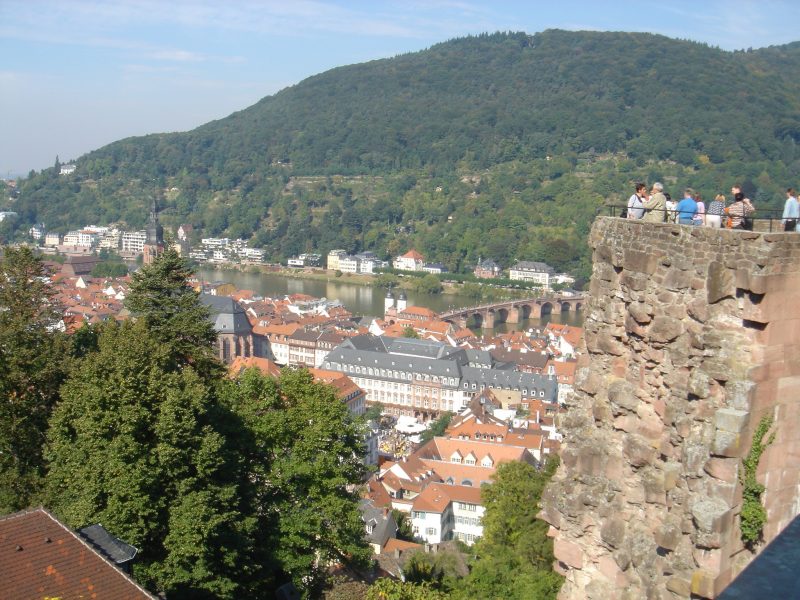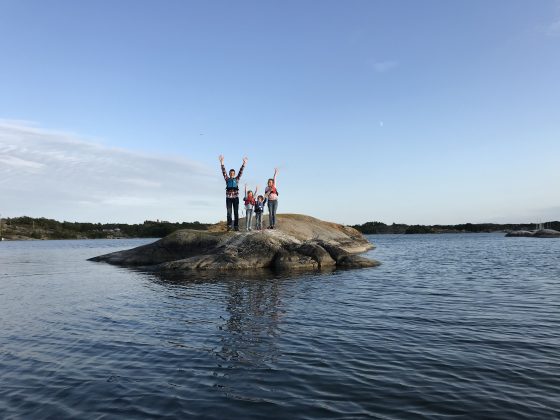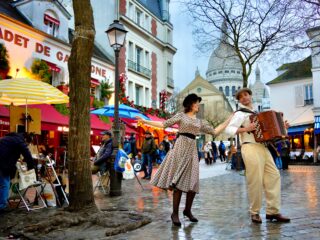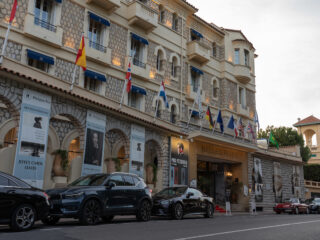By Lev Raphael
On my first German book tour, I was so excited to be going that I didn’t think through the connections or the times involved, I just said yes to all the arrangements. I didn’t review flight or train schedules closely.
Writer friends had told me that their best experiences on tour had been in Germany because that country had a rich and vibrant book culture and writers were considered artists. “You’ll be amazed at how well people treat you” was the consensus.
So I plunged into packing and studying guidebooks and brushing up on my German without thinking about what the travel itself would be like.
Big mistake. And the tour started out with a nightmare.
Now, I’m a good flyer and have been since my first flight to California from New York to see a friend was storm-wracked over the Rockies and the “chop” was so heavy that the man next to me wept, fogging up his glasses as he grabbed my arm, moaning how we were doomed and he’d never see his horse again: “I love that horse!” There was so much panic on that plane the flight attendants wheeled drink carts around an extra time, I suppose thinking that the alcohol would calm us down. Later I wondered if they, too, thought we were doomed and being knocked out by booze when we crashed would be a blessing.
The return of that trip also started badly, which I guess made it a darkly perfect bookend. An engine on my side of the plane started smoking and caught fire before we even began to taxi and we had to deplane. When the later flight got to Chicago, the flight attendants actually urged us to “Run! Run!” if we wanted to make our connections. I was seventeen and skinny and managed to reach the flight home, but my suitcase of course didn’t. I felt like a veteran after those experiences, but nothing then or since prepared me for flying to Germany years later.
***
The eight-hour flight from Detroit to Amsterdam was terrible from the very beginning. My seat at the end of the row didn’t recline and I was right near a toilet whose miasma swept over me every time it opened and shut. As if in harmony with the stench, a kid threw up in the aisle just feet away soon after takeoff, and less than two hours after that, there was an intercom call for a doctor.
Whatever had happened to the person who needed medical attention, we turned around over the Atlantic and headed to Newfoundland. I was supposed to do a reading later that same day in Berlin and feared I wouldn’t make it, but short term, I thought we would die because we descended in the dark—until the very last minute when runway lights came on. What was that about?
I didn’t have an international phone plan (my European phone would go live once I got there), so I called home and asked my spouse to email my German agent to let him know there might be a problem.
Nobody told me to run in Schiphol Airport when I got to Amsterdam, but when I checked the monitors, I realized that I had to, cutting through that amazingly crowded bright maze which wasn’t any less awful for my knowing enough Dutch to read the signs. But knowing Dutch got me in trouble because when I asked questions at an information counter in Dutch but momentarily switched to English when I forgot a word, I got the kind of outraged stare you receive telling a stranger he has spinach in his teeth.
I arrived at my gate sweaty, disheveled, almost out of breath, and looking like I’d been dragged out of a dog’s throat (as my Polish mother used to say), and found that the plane was now seriously delayed instead of on time. I contacted my agent and was urged to hurry.
Right. . .
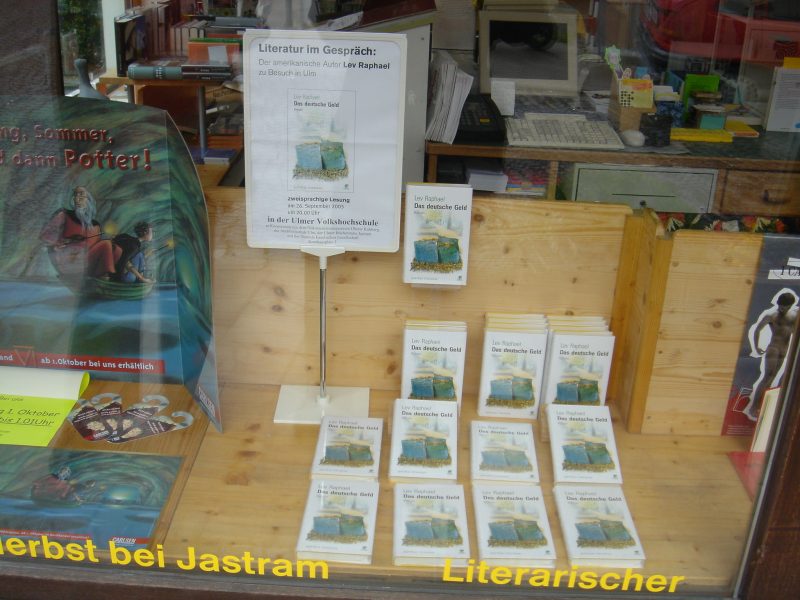
When I finally got to Tegel Airport in Berlin, the representative of my German publisher who picked me up quietly scolded me for being late and warned me that we had just half an hour to my reading. I did not panic. I was too strung out.
The bare-bones monastic-feeling hotel was right next to the small conference center and when we arrived, I had just enough time to wash my face, change shirts and be hustled into the room that is a total blur to me now. All I remember is a group of three extremely dapper men from the publishing house and my agent, looking white-faced and disapproving by the door. I was late. In Germany. Could there be anything worse?
The audience was smaller than I expected, barely twenty people, but I shrugged that off. . After all, I’d spoken to five hundred people and five—every audience deserved my best. But I couldn’t help wondering why the hell I hadn’t insisted on coming in a day early so that I would be rested.
I gave a short introduction in German, a good enough reading from part of my novel in English considering the trip over, and answered questions calmly, soothed by the familiar rhythms of the kind of event I’d been doing for years in the U.S.
Then a woman asked in German, “How does your novel end?”
I confess that I snapped at her: Aber Sie müssen das Buch lesen! (You have to read the book.)
I don’t think the gang from my publisher was happy.
But seriously, my novel The German Money was partly a mystery about the past of a Holocaust survivor, so why would I reveal anything connected to the secret?
That evening, after a tranquilizing dinner nearby of savory schnitzel and tangy Kartoffelsalat (vinegar-based potato salad), I hit an Internet café to send some quick emails home and discovered that the German keyboard is designed for Germans, with keys in all the wrong places for me, garbling the simplest sentences. Friends and family later said that my emails read like I was on drugs.
Next, I got lost heading back to the hotel and couldn’t make sense of the laminated Berlin street map I’d brought along. Dizzy with fatigue and Köstritzer, a really good dark beer, I finally asked a passing thirtyish business-suited man in German if he knew where I could find my hotel.
He seemed surprised. “Sie stehen davor.”
I was standing right in front of it, too tired to even read the sign. I thanked him profusely and he walked off after briefly complimenting my German. That momentarily lifted me out of my stupor and made all the time I’d spent studying German in classes, online, and via CDs worthwhile. I had half a dozen cities ahead of me. My German had worked at the reading, in the restaurant and out on the street. I would be okay after a good night’s sleep.
And then I carefully examined my schedule before getting ready for bed. The tour organizer had put me on a very early train the next morning, the next day, and in every city all the way around Germany. Even when I had evening readings and could easily have left mid-morning.
Kaum zu glauben, I thought, unbelievable, as exhaustion ended my night in a narrow single bed that was too short for someone six feet tall, in a room whose toilet was truly as small as a broom closet.
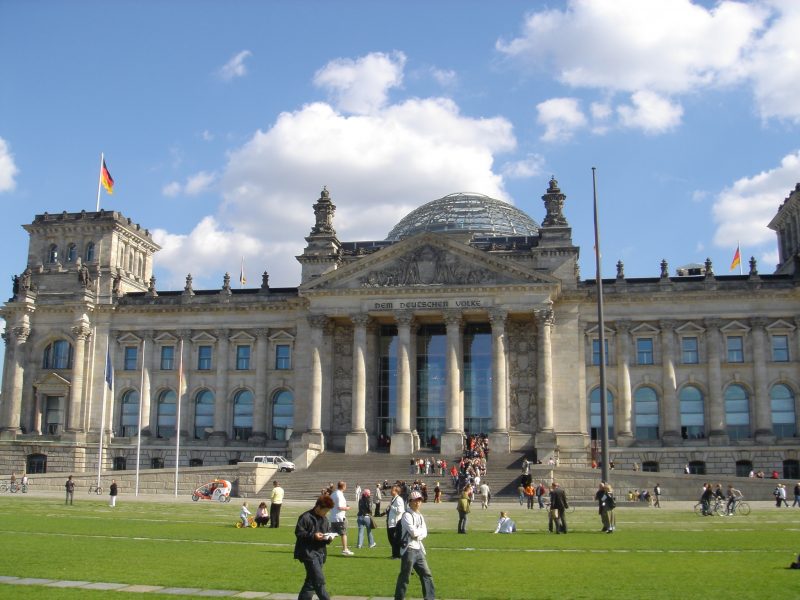
Those two weeks in Germany, I struggled to get my train tickets changed and even had to switch hotels in one city because my room was filthy, hot, and hosted a giant bug I didn’t examine closely. But every day I felt more comfortable speaking German and I was awed by my hosts at each venue who were even more generous and welcoming than I could have imagined. They gave me gifts at each stop, which did not ever happen in the U.S.: wine, chocolate, CDs, books, calendars, museum catalogs, city souvenirs, and local tour guides. It was almost overwhelming. I’d never been treated so well on an American book tour and the rush to Berlin started to fade in the face of so much kindness and appreciation.
But all this gift giving came with a price: twice during the tour I had to have everything I was given, except for the food and alcohol, packaged and shipped home, and my preparatory German study never included how to use a post office. The springtime weather was unbelievably hot even for Germany, the bags of gifts were extremely heavy and awkward to transport from my hotel to the post office, and on one excursion in Heidelberg I was so frazzled and frustrated that I managed to scatter a group of skinheads in my path because I must have looked crazed.
On a phone call home, a friend tried to encourage me: “This is character building!”
I felt that I had enough character already, but I had to admit that eventually these experiences would be fuel for essays–and maybe even a book. Everything’s material sooner or later for writers, especially when things go so dramatically wrong. Look at the hilarious Pulitzer Prize-winning novel Less by Andrew Sean Greer in which a failed fiftyish novelist experiences trouble and humiliation in Paris, Berlin, India and Morocco. It’s fiction, but only someone who’s actually had serious trouble on a book tour could dream up such chaos.
Fortunately I was never that unlucky. I never showed up to an empty bookstore in Germany as happened more than once while I was on tour in the U.S. I think that’s because author readings in Germany weren’t overbooked like they seemed to be back home, and so a reading was truly an event. Even better, all of the book stores surprised me by serving Sekt, that sparkling fruity German wine, to the patrons who attended. They had even purchased tickets—and still they bought books afterwards.
My audiences listened with an intensity I wasn’t used to, and when I commented to a new German friend that they seemed on the quiet side at first, she said, “That’s out of respect.” It made sense, because in every major train station I passed through, there were enormous ads for current books—and these weren’t just thrillers that might attract an international audience. Literary novels and their authors received star treatment.
Though I knew some German, the publisher wisely arranged to have a different translator at each event to read the same section of my book after me in German and to help me field questions. That gave me a sense of support I wasn’t used to, and I was fascinated to hear my own work read aloud in German because I only knew the translated text on the page. The German version always took longer because of the complexities of German grammar, and sitting there, I felt I was not just being entertained along with the audience, but educated.
I also learned that pounding a desk or table is a German form of applause, and the sound of it carried me across the country and made the horrendous trip over seem less and less significant. It continually amazed me that I was in Germany, the country I had never imagined traveling in because my parents were Holocaust survivors. Actually in Germany and enjoying myself. Those feelings are partly why I felt compelled to eventually write a memoir/travelogue, My Germany, which led to two more book tours there (and much better transatlantic flights).
All the same, I was not always at my best when away from my venues, like the time a clerk at a train station pharmacy asked why I spoke German but didn’t know the word for “battery.” So I switched to French and explained with asperity that my francophone mother tutored me for the eight years I studied French in school which culminated with my winning the high school’s French language award.
“Mais elle détestait l’allemand, donc, j’ai quelques lacunes.” She hated German, so I have some gaps.
I didn’t go on to explain that after her city was overwhelmed by the Nazis, my mother survived the Vilna ghetto, a Latvian concentration camp, and then ended WWII in a German slave labor camp whose prisoners were forced to make munitions to fight the Allies.
That would have been overkill because he was already flummoxed.
Besides, I was happy to learn a new word, well, sort of: battery is Batterie.
Lev Raphael is the author of 27 books in genres from memoir to mystery including the memoir My Germany and mentors writers at writewithoutborders.com. You can follow him on twitter at @LevRaphael.

